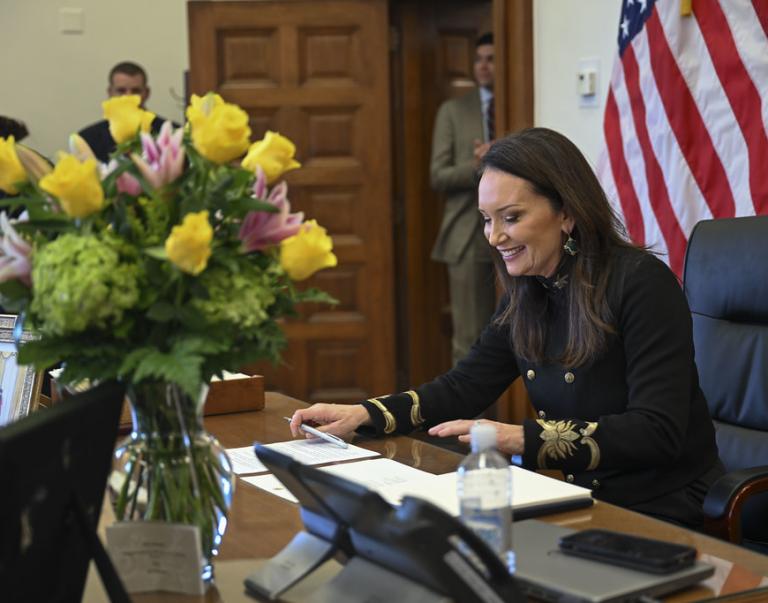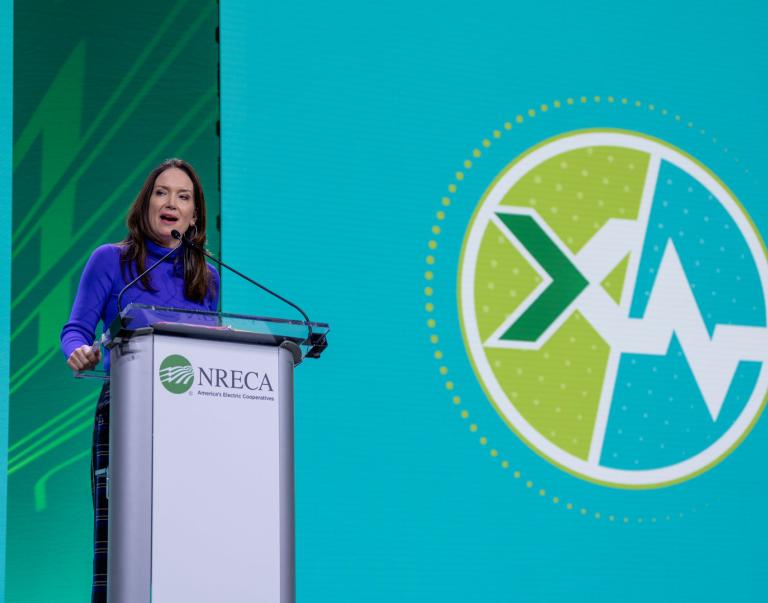On March 26, U.S. Department of Agriculture (USDA) held the first Regional Equity Convening at Carhartt Headquarters in Dearborn, Michigan in partnership with Carhartt and the State of Michigan. Regional leaders and local stakeholders from across the Midwest were invited to learn about the recommendations included in the Equity Commission Final Report that was released at the National Equity Summit in February 2023. Equity Commission members Todd Corley (Senior Vice President for Inclusion, Sustainability, and Community at Carhartt) and Poppy Sias Hernandez (Chief Equity and Inclusion Officer, State of Michigan and Executive Director, Office of Global Michigan) co-created the program to learn about national, state, and local efforts to advance equity at the local level though public and private partnerships.
As an opportunity to engage with stakeholders, the Midwest Regional Convening gathered more than 100 stakeholders—including USDA leaders—to discuss the future of partnerships in agriculture. The panel discussions explored the next generation of farming, ownership, sustainable agriculture, food security, and food sovereignty, and how partnerships can enhance and contribute to USDA’s ongoing work to advance equity and improve access to programs and services. Below are some highlights from the sessions throughout the day.
“As we think about how we address equity, we know we can’t do it alone.”
– Robert Bonnie, Under Secretary for Farm Production and Conservation
Robert Bonnie, USDA’s Under Secretary (U/S) for Farm Production and Conservation, opened the convening stating, “We need to build partnerships and ensure that partnerships are infused in everything we do in the Department so that we can take the recommendations of the Equity Commission and turn it into real work.” U/S Bonnie also highlighted how USDA is looking at all challenges facing agriculture through a “prism of equity and a prism of climate” designing programs such as the Partnership for Climate Smart Commodities to ensure all the needs of all customers are being considered.
During the panel discussion on national partnerships, moderated by U/S Bonnie and featuring national partner panelists, Lauren Bright, Co-Founder of California Cotton & Climate Coalition – (C4) noted, “We are making strides, in part through the partnership for climate smart commodities as we are evolving alongside the Climate Beneficial Verification Program.” Equity Commission Member Shirley Sherrod also noted that the key is “finding the partners to help us make the difference.” USDA announced earlier this month $1.5 Billion Available to Help Farmers Advance Conservation and Climate-Smart Agriculture as Part of President Biden’s Investing in America Agenda.
“The more young minds we can bring to this space to drive innovation, the better.”
– Dr. Lisa Ramirez, USDA’s Director of the Office of Partnerships and Public Engagement
Following the showcase of a documentary about the Farmlink Project, Dr. Lisa Ramirez, USDA’s Director of the Office of Partnerships and Public Engagement, led a Q&A with Co-Founder Aidan Reilly. During the pandemic, Reilly—then a college student—started an organization dedicated to delivering millions of pounds of farm fresh produce, that would otherwise be wasted, to feed families facing food insecurity. He maintained that “food insecurity is simply a logistics and collaboration problem,” and showed how through collaboration and partnerships, his organization is helping solve generational problems. By involving thousands of young people in what started as a student movement during the pandemic, they are now deciding to change their future to work in this space. USDA is committed to the next generation of leaders and last year alone, NIFA awarded more than $262.5 million for 33 projects across 24 states and Insular Areas with the goal of enabling institutions to train and support students to build the next generation of the food, agriculture, natural resources and human sciences workforce, including the future USDA workforce.
“One of the most rewarding aspects of working closely with our state and local partners is
creating stronger and healthier environments for people to live and thrive.”
- Gloria Montaño Greene, USDA’s Deputy Under Secretary for Farm Production and Conservation
Gloria Montaño Greene, USDA’s Deputy Under Secretary for Farm Production and Conservation, moderated a panel session with leaders from across Michigan. She noted that “through our [USDA’s] joint efforts with Michigan Department of Agriculture and Rural Development (MDARD), the Michigan Conservation Reserve Enhancement Program (CREP) has made strides in protecting Michigan watersheds by incentivizing more farmers and landowners in priority watershed areas to incorporate conservation practices.” Panelist Dr. Tim Boring, MDARD Director shared, “We’ve been doing a lot of listening, but we know we need to do better and are doubling down on empowering people. We need people to be partners with us internally and get an accurate representation of what Michigan looks like.”
“We are putting equity not only at the front of what we do but at the heart of what we do.”
- Farah Ahmad, USDA’s Deputy Under Secretary for Rural Development
Farah Ahmad, USDA’s Deputy Under Secretary (DUS) for Rural Development participated in the closing plenary alongside Equity Commission member co-hosts Todd Corley and Poppy Sias Hernandez. Ahmad highlighted recent successes and stated, “working with partners like the Office of Rural Prosperity in Michigan provides USDA the opportunity to collaborate on initiatives that connect communities to essential resources like technical assistance, broadband infrastructure and housing.” When asked about next steps, Member Corley committed to “fostering relationships to drive change” and “being intentional around the language we used to talk about things.” For Corley, all stakeholders need “to hold each other accountable to continue talking [...] in a shared language about what the common goals and results are.” Member Sias Hernandez emphasized the need for partnerships between the state and federal level, noting that “if states don’t get on board with implementing change, it’s not real.” Both Members are committed to reinforcing the Equity Commission recommendations in their work; and DUS Farah Ahmad referred to the Commission’s recommendations “as a gift to help us prioritize and help elevate the voices of the communities we all serve.” She closed by stating “We can’t do it ourselves - but we can through the Power of Partnerships.”
“This convening is a significant milestone in USDA’s march towards equity and there is a lot of hope in the room.” – Dr. Dewayne Goldmon, USDA’s Senior Advisor for Racial Equity
Dr. Dewayne Goldmon, USDA’s Senior Advisor for Racial Equity, closed the day on an optimistic note by reading the poem “It Couldn’t be Done” by Edgar Albert Guest, who grew up in Detroit. Dr. Goldmon acknowledged the problems and challenges that he heard from stakeholders throughout the day and committed to continuing to listen and engage with communities USDA serves. He also recognized the need for USDA to apply lessons learned from traditional agriculture to urban agriculture particularly through a lens of equity. He ended with a call to action from the poem:
“Just start in to sing as you tackle the thing that “cannot be done,” and you’ll do it.”
###
USDA hosted its first National Equity Summit in February 2024 to kick off its equity engagements planned throughout the year that will connect the Department with stakeholders on the ground in an effort to raise awareness of its new, and improved, programs and services and to encourage customers to participate. The co-hosted Carhartt and State of Michigan event is the first forum since the release of the Equity Commission’s Final Report at the National Equity Summit. Additional convenings will be held across different geographic regions in communities represented by members on the Equity Commission to provide USDA with an opportunity to engage with communities across the country and further emphasize the Department’s commitment to improve access to programs and services for all stakeholders and communities.




